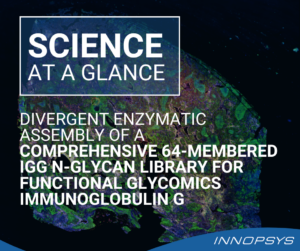SCIENCE AT A GLANCE
Divergent Enzymatic Assembly of a Comprehensive 64-Membered IgG N-Glycan Library for Functional Glycomics Immunoglobulin G
One of the most common antibodies presented primarily in the blood and tissues, plays a significant role in physiological and pathological activities. It has been discovered that IgG comprises a conserved N-glycosylation site at Asn297 in the Fc domain and 15–25% N-glycans in the Fab region, which can remarkably alter and modulate their biofunctions through the synergistic effects of glycan structures and intrinsic peptide sequence. Through glycoengineering technologies, two FDA approved defucosylated antibodies named Mogamulizumab and Obinutuzumab have been produced and clinically used. Structurally well-defined IgG N-glycans with high purity and sufficient quantity are urgently needed for elucidating the biofunctions of IgG N-glycosylation and developing diagnostic tools as well as glycoengineered antibody-based drugs. To address this problem, scientists at Chinese Academy of Sciences, reported an easy-to-implement divergent approach to enzymatically assemble a comprehensive and unprecedented 64-membered IgG N-glycan library containing all possible biantennary and bisected N-glycans with or without core fucosylation from a readily accessible precursor. The synthetic 64 N-glycans were subjected to a systematic exploration into the binding specificities with plant lectins and immune-associated lectins using glycan microarray technology, thereby providing abundant information for the development of diagnostic reagents and antibody- based drugs.
Original publication : https://onlinelibrary.wiley.com/doi/10.1002/advs.202303832
#microarray #glycomics #glycanlibrary #glycanmicroarray #antibodydrug


